Het is lastig om tegen het idee van inclusieve welvaart te zijn, schrijven Richard Straub en Julia Kirby1) in een artikel in Harvard Business Review dat gaat over zinvol werk dat niet alleen aan de elite is voorbehouden. Nu het economisch weer beter gaat, zou onze welvaart breed gedeeld moeten worden. Maar zoals gewoonlijk zit het venijn hem in de staart. Als mensen reclame gaan maken voor inclusieve groei bedoelen ze niet altijd hetzelfde.
Sommige mensen worden geïnspireerd door Thomas Piketty met zijn nieuwe ideeën over economie2). Deze mensen zijn gericht op de verontrustende ongelijkheid van inkomen en welvaart van mensen3). Anderen beschrijven welvaart niet in financiële termen maar meer in termen van algemeen welzijn. Zij zijn meer gericht op de mate van groei van de diverse aspecten4) van welvaart in de samenleving.
Een derde groep benadert het onderwerp meer vanuit het oogpunt van bedrijfsvoering. Eric Beinhocker en Nick Hanauer5) schreven: “Welvaart in een maatschappij is de opeenstapeling van oplossingen voor menselijke problemen”. Door nadruk op het woord oplossingen als motor van groei willen zij het kapitalisme neerzetten als een dynamiek voor welvaart (als het systeem dat constant met de beste oplossingen komt). Maar hun manier van denken over welvaart geeft ook richting aan die managers die zich willen inspannen om de wereld beter te maken: het is uw missie om meer oplossingen ter verbetering van het leven te bedenken, te ontwikkelen en aan te dragen. Vooral producten en diensten die het leven van gewone mensen verbeteren. Bedrijven hebben diverse maatschappelijke verantwoordelijkheden, en de meest essentiële daarvan is innovatie.
Daar komt nog bij dat als we het over welvaart in het algemeen hebben, we zouden moeten erkennen dat oplossingen alleen niet de kwaliteit van leven verbeteren, maar ook het betrokken zijn bij het bedenken van oplossingen. Deelnemen aan de praktijk van het innoveren geeft voldoening en verrijkt het leven van de mens. Het maakt het leven zinvol en waardig. Het vermogen uitdagingen het hoofd te bieden geeft vreugde6). Problemen oplossen is deel van de menselijke natuur. Deelnemen aan innoveren is essentieel voor het goede leven. Geen enkele elitaire minderheid hoort daar het monopolie op te hebben.
Massa’s burgers van geen enkele economische waarde
De vraag rijst hoe wij mensen in staat stellen betrokken te raken bij het oplossen van problemen. Elk mens is in staat tot creatief denken en handelen. Excellente managers weten hoe je die rijke bron kan aanboren. Zij zien hoe het bijeenbrengen van creatieve energie tot goede resultaten leidt. Vele handen maken licht werk.
We hebben meer organisaties nodig die beseffen dat hun innoverende taak niet alleen bestaat uit het ontwerpen van nieuwe producten en diensten, maar ook uit opnieuw uitvinden hoe het werk gedaan moet worden. Het digitale tijdperk geeft ons een geweldige kans om dat te doen, maar het brengt ook risico’s met zich mee. De manier waarop bedrijven zich blijven ontwikkelen en informatietechnologieën inzetten zal grote invloed hebben op de welvaart. Wordt die welvaart inclusief of exclusief?
In het beste geval stellen machines mensen in staat effectiever samen te werken7). Leren door ervaring wordt schaalbaar8). Samenwerkende platforms stellen mensen in staat om bijvoorbeeld de gegevens over de kwaliteit van water9) met elkaar te delen terwijl de opmars van machinaal leren, kunstmatige intelligentie en computerrekenkracht de grenzen van het menselijk intellect verleggen, op de manier zoals in het verleden nieuwe technologieën dat hebben gedaan met de menselijke lichaamskracht.
In het slechtste geval hebben slimme machines het vermogen de menselijke rol te marginaliseren en kennis te automatiseren, de maatschappij achterlatend met, zoals Bill Davidow en Michael Malone het noemden “massa’s burgers van geen enkele economische waarde”10). Deze situatie schept enorme verantwoordelijkheden voor politici, leraren, managers en anderen om de transitie met de daarmee gepaard gaande moeilijkheden in goede banen te leiden.
Op een kritiek punt
We staan op een kritiek punt. De technologieën die onze menselijke soort ontwikkelt kunnen òf de sleutel zijn tot ontsluiting van menselijk potentieel, òf het opsluiten van menselijk potentieel in een gevangenis. Ze kunnen zelfs ons denken transformeren, gelet op de verbazingwekkende combinaties van technologische en menselijke vermogens die ontworpen worden. Het is niet nodig te wachten op Neuralink van Elon Musk11) die elektrodes in de hersenen wil planten om de menselijke hersencapaciteit met kunstmatige intelligentie te verbinden. Arati Prabhakar, de voormalige directeur van het Amerikaanse Defense Advanced Research Projects Agency (Darpa) heeft geschreven dat de vermenging van mens mens en machine al aan de gang is.12)
Clay Christenson, de architect van de disruptieve innovatie, herinnert vernieuwers er graag aan in hun offertes het belang van het essentiële “werk dat moet worden gedaan“ niet te vergeten. Waarom precies willen klanten jouw product of dienst “inhuren”? Hetzelfde geldt voor het management. Wat is de taak van het management bij het “werk dat moet worden gedaan”? Voor dat werk heeft de maatschappij competente managers nodig. Niet alleen voor het maken van betere producten of het leveren van efficiëntere diensten, maar om personen met elkaar te kunnen laten samenwerken op een ongekende manier. Bedrijfsleiders die dat voor elkaar krijgen, zijn degenen die het beste weten te halen uit het menselijk potentieel. Zij zullen erin slagen de welvaart inclusief te maken.
1) Richard Straub is oprichter van de Peter Drucker Society Europe na een carrière van 32 jaar bij IBM. Hij is lid van het dagelijks bestuur van de European Foundation for Management Development, secretaris-generaal van de European Learning Industry Group en adviseur van IBM Global Eudaction.
Julia Kirby is redacteur van Harvard University Press en medewerker van Harvard Business Review. Haar boek Only humans need apply: Winners and losers in the age of smart machines, geschreven met Tom Davenport, verscheen in 2016.
Meaningful work should not be a privilege of the elite, Harvard Business Review, 3 april 2017: https://hbr.org
2) After Piketty: The agenda for economics and inequality, Heather Boushey, Bradford DeLong en Marshall Steinbaum, Harvard University Press, 2017
3) Basic income: A radical proposal for a free society and a sane economy, Philippe Van Parijs en Yannick Vanderborght, Harvard University Press, 2017
4) Global prosperity is at its highest point in the past decade, The Legatum Prosperity Index, 2016: www.prosperity.com/download_file/view_inline/2884
5) Redefining capitalism, Eric Beinhocker en Nick Hanauer, McKinsey Quarterly, september 2014: www.mckinsey.com/featured-insights/long-term-capitalism/redefining-capitalism
6) The power of small wins, Teresa Amabile en Steven J. Kramer, Harvard Business Review, mei 2011: https://hbr.org
7) Only humans need apply: Winners and losers in the age of smart machines, Thomas H. Davenport en Julia Kirby, Harper Business, 2016
8) Schaalbaar = term in de IT-wereld. Electronische berichten (bijv. e-mail) van verschillende platforms naar verschillend platforms versturen (bijv, van personal digital assistant naar mobiel, of van pc naar interactieve tv).
9) EarthEcho Water Challenge: www.worldwatermonitoringday.org
10) What happens to society when robots replace workers? William H. Davidow en Michael S. Malone, Harvart Business Review, 10 december 2014: https://hbr.org/orkers
11) Elon Musk launches Neuralink, a venture to merge the human brain with AI, The Verge, 27 maart 2017: www.theverge.com
12) The merging of humans and machines is happening now, Arati Prabhakar, Wired, 27 January 2017: www.wired.co.uk
Het thema van het negende internationale Global Drucker Forum in Wenen, dat plaatsvindt op 16 en 17 november 2017, is gewijd aan groei en inclusieve welvaart: Growth and Inclusive Prosperity.
Global Drucker Forum: www.druckerforum.org/home/
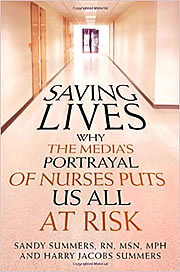 Hugo van der Wedden blogt in het digitale magazine Nursing dat het tekort aan verpleegkundigen voor een groot deel is te verklaren door het slechte imago van het vak. Voor dat slechte imago zijn volgens hem de media grotendeels verantwoordelijk. Het tekort aan verpleegkundigen is overigens een wereldwijd probleem.
Hugo van der Wedden blogt in het digitale magazine Nursing dat het tekort aan verpleegkundigen voor een groot deel is te verklaren door het slechte imago van het vak. Voor dat slechte imago zijn volgens hem de media grotendeels verantwoordelijk. Het tekort aan verpleegkundigen is overigens een wereldwijd probleem. Herman van den Bosch, hoogleraar managementwetenschappen aan de Open Universiteit, wijdt zijn nieuwe blog aan kritisch denken. Kritisch leren denken is noodzakelijk, maar volgens hem schieten universiteiten daarin tekort.
Herman van den Bosch, hoogleraar managementwetenschappen aan de Open Universiteit, wijdt zijn nieuwe blog aan kritisch denken. Kritisch leren denken is noodzakelijk, maar volgens hem schieten universiteiten daarin tekort.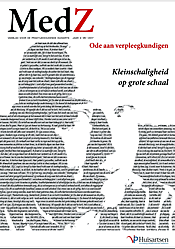
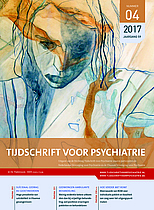
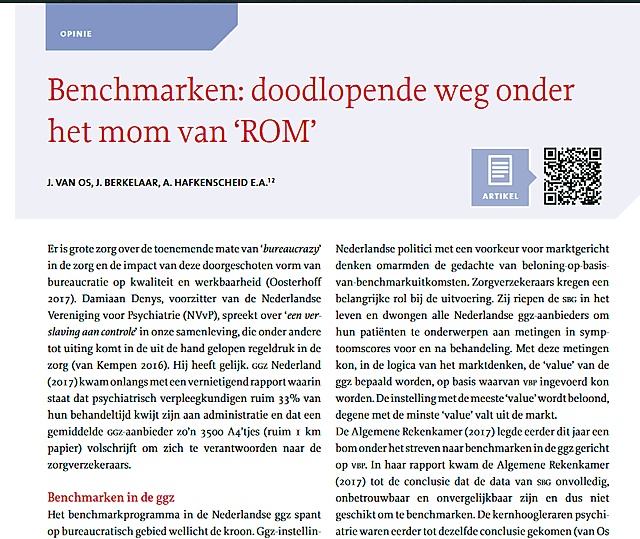

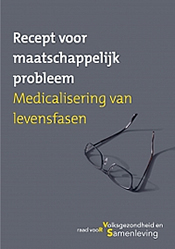 Druk gedrag bij kinderen, onzekerheid onder jongvolwassenen, afnemende vruchtbaarheid, overbelasting in het spitsuur van het leven, functievermindering met het ouder worden: iedere levensfase gaat gepaard met verschijnselen die kunnen leiden tot vragen, ongemakken en problemen.
Druk gedrag bij kinderen, onzekerheid onder jongvolwassenen, afnemende vruchtbaarheid, overbelasting in het spitsuur van het leven, functievermindering met het ouder worden: iedere levensfase gaat gepaard met verschijnselen die kunnen leiden tot vragen, ongemakken en problemen.